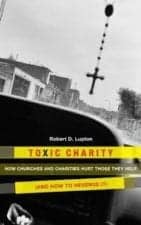I just finished reading Toxic Charity, and want to commend it to every pastor and every deacon board of every church that is involved in mercy ministry. It is written by Robert Lupton, a veteran urban activist, someone who has been an urban activist for many years, and who has seen what he is warning us about up close.
If the goal of charity work is to actually help the people you are helping, then the principles that Lupton outlines will be immediately evident. If the goal is some other thing, which it frequently is, then the temptation will be to write this off as just one more conservative attempt to beg off helping the less fortunate. But Lupton has the moral authority to speak to this issue, having spent his life seeking to actually help out.
Charity work can be devastating. When the facts of such devastation become undeniable, and yet are still denied, it must be because powerful forces are at work within the philanthropists. And what is more powerful than selfishness? When people are trying to work off the guilt, and you tell them to do something different, you are telling them to throw away their one chance at atonement. And when people are giving in order to display their own sense of superiority, and you tell them to do something different, you are asking them to topple their god.
Mercy ministry needs to extend mercy that actually relieves, mercy that actually helps. Lupton lays out the necessary principles that must be kept in mind—and they apply to individual relief, to rebuilding neighborhoods, and to foreign aid. Every church that has a benevolence fund, a food bank, a neighborhood ministry, or any other ministry that wants to do good in this world should read and study this book.


